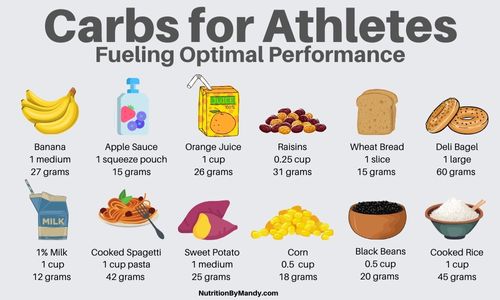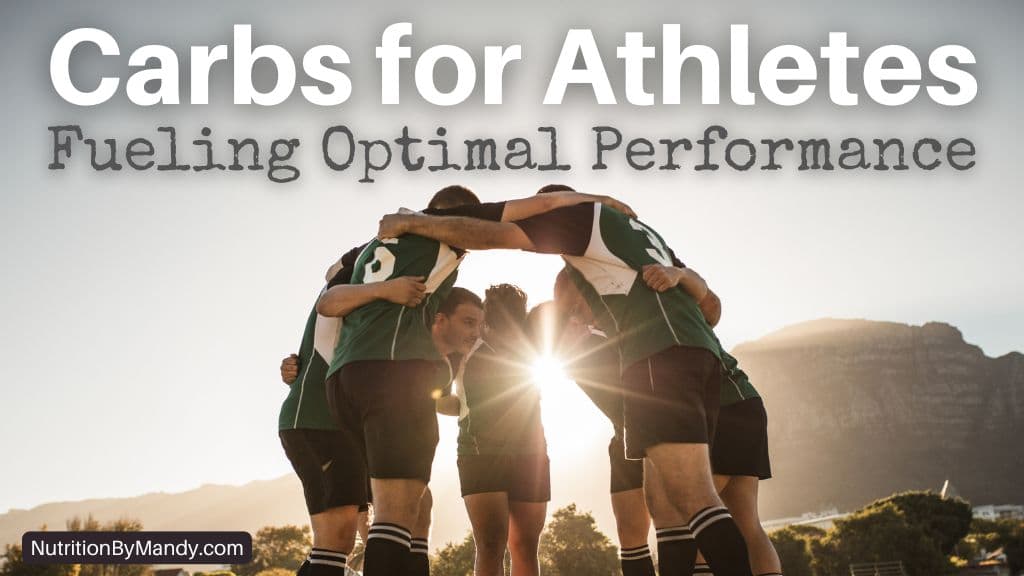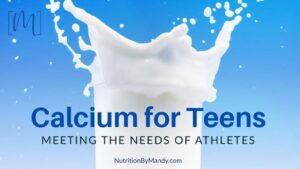Last Updated on November 14, 2025 by Mandy Tyler, M.Ed., RD, CSSD, LD
Carbs for Athletes: Fueling Optimal Performance
Carbohydrates (carbs) are an important part of an athlete’s sports nutrition meal plan. Similar to gas for a car, carbs provide athletes with the energy needed for daily activities as well as sports performance.
Despite their importance, I find athletes are often confused about their carb needs. I frequently get questions on daily carb needs as well as carbs to support activity.
Let’s look at what carbs are, dietary sources of carbohydrates, and clear up some of the confusion surrounding the carb needs of athletes.
What are Carbohydrates?
Carbohydrates are one of the main macronutrients that contribute calories to an athlete’s diet. Each one gram of carbohydrate contains four calories.
Carbohydrates can be classified into two broad categories – simple and complex carbohydrates.
Simple vs. Complex Carbs for Athletes
Simple carbs have a basic structure consisting of one or two sugar molecules. The body can rapidly breakdown simple carbs to use for energy (1).
There are naturally occurring simple carbs, such as fructose found in fruit and lactose in milk. Food products may also contain added sugars (simple carbs); examples include candy and soda.
Complex carbs are made up of a more complex structure and take longer to digest. Starches as well as dietary fiber are both types of complex carbs (1, 2).
Adding Simple and Complex Carbs to an Athlete’s Meal Plan
There is a place for both simple and complex carbs in an athlete’s sports nutrition meal plan.
Immediately before and during activity, simple carbs can provide athletes with a quick source of energy. Complex carbs, that contain dietary fiber, vitamins, and minerals, are a nutritious addition to an athlete’s meals and snacks throughout the day.
Carbs for Athletes: Dietary Sources
Athletes can add carbohydrates to their diets from a variety of food sources, including:
- Grains: Pasta, rice, quinoa, oatmeal, cereal, bread, bagels, wraps
- Fruit: Fresh, frozen, dried, canned in natural juices, applesauce
- Starchy vegetables: Potatoes, sweet potatoes, winter squash, corn
- Beans, peas, legumes
- Milk, yogurt
To provide a point or reference, the graphic below shows the amount of carbohydrates in commonly consumed foods and beverages (3).

Gluten-Free Carbs for Athletes
There are numerous ways that athletes following a gluten-free diet can meet their carbohydrate needs.
Gluten is a type of protein that is found in wheat, barley, rye, and hybrids of these grains (4). Athletes following a gluten-free diet need to avoid products made with these grains.
However, fruits, vegetables, beans, legumes, milk, and yogurt are naturally gluten-free*. In addition, athletes following a gluten-free diet can enjoy gluten-free grains, such as rice, quinoa, and corn.
For additional information on meeting carb needs on a gluten-free diet, review my blog on gluten-free carbohydrates for athletes.
*Note: Athletes should always read the food label carefully to ensure gluten-containing ingredients were not added to the product.
Carb Recommendations for Athletes
Carbohydrate recommendations for athletes vary based upon the intensity and duration of activity the athlete is participating in (5).
Athletes participating in low-intensity or skill-based activities (i.e., golf) need less carbohydrates than athletes engaged in high-intensity, long duration exercise sessions (i.e., cross-country running).
Daily Carb Needs of Athletes
The chart below provides an overview of an athlete’s carb needs based upon activity (5).
For an additional point of reference, the last column shows the daily carb needs of a 165-pound athlete at each intensity level.
| Activity | Grams of Carbs/Day | 165-pound Athlete |
| Low-Intensity / Skill-Based Sport | 3-5 g/kg/day | 225 – 375 g/day |
| Moderate Intensity Exercise ~1 hour/day | 5-7 g/kg/day | 375 – 525 g/day |
| Endurance Exercise 1-3 hours/day Moderate – High Intensity | 6-10 g/kg/day | 450 – 750 g/day |
| Endurance Exercise >4-5 hours/day Moderate – High Intensity | 8-12 g/kg/day | 600 – 900 g/day |
Athletes need more carbohydrates in their diet (gas in their tank) on days when they will be exercising at a high-intensity or for a longer duration than on low-intensity workout days or off-days.
Fluctuating the amount of carbohydrates consumed based on activity can help athletes tailor their daily meal plan to meet their performance needs.
Carbs for Athletes Surrounding Activity
Carbs provide an important source of energy for athletes during activity. When putting together a game day nutrition plan for athletes, it is important to consider the following:
- Fueling up with carbohydrates prior to the activity
- Replacing carbohydrates during the event
- Refueling following activity to replace carbohydrate stores
Pre-Event Carbs for Athletes
The amount of carbs that an athletes should eat prior to a workout or competition depends on how far in advance of the activity the meal/snack will be consumed.
When athletes have more time prior to the activity, a larger pre-workout meal/snack can be consumed.
The chart below depicts carbohydrate recommendations based upon the time until the event (5).
| Time Before the Event | Amount of Carbs | 165-pound Athlete |
| 1 hour | 1 g per kg body weight | 75 grams |
| 2 hours | 2 g per kg body weight | 150 grams |
| 3 hours | 3 g per kg body weight | 225 grams |
| 4 hours | 4 g per kg body weight | 300 grams |
Pre-Workout Meal for Athletes
When possible, I encourage athletes to schedule their pre-game meal ~3-4 hours prior to the start of the competition. This allows time for digestion as well as for the athlete to go to the bathroom before the event, if needed.
To meet their carb needs before activity, athletes should ensure that carbohydrate-rich choices are at the foundation of their pre-game meal. In addition to carbs, athletes can include a moderate amount of protein with their meal.
High-Carb Pre-Game Meal Ideas for Athletes
High-carb pre-game meal ideas include
- High-carb breakfast – Pancakes topped with strawberries, scrambled eggs, 100% fruit juice
- Bagel with nut butter and banana slices, fruit smoothie
- Turkey sub sandwich, pretzels, Greek yogurt and fruit parfait
- Pasta with red sauce and grilled chicken, fresh sliced fruit cup, Italian bread
High-Carb Pre-Workout Snacks for Athletes
When athletes have limited time before the start of the activity (<1 hour), it is best to stick with an easy-to-digest, high-carb snack.
Eating foods that are high in fat, fiber, and/or protein too close to the activity may lead to GI distress during the event (5).
High-Carb Snack Ideas for Before a Workout
Easy carbohydrate-rich snack ideas to eat prior to the workout include:
- Banana or small piece of fresh fruit
- Applesauce squeeze pouch
- Bagel, toast with jelly
- Carbohydrate-based sports bar, cereal bar, fig bar
- Animal crackers, graham crackers, pretzels, pita chips
- Sports drinks, chews, gels

During Event Carbs for Athletes
Consuming carbs during an event provides athletes with a source of additional energy for their working muscles, supplementing their carbohydrate stores (5).
In general, athletes engaging in activity lasting > 60 minutes can benefit from consuming carbs (30-60 g/hour) during their exercise session (5). This includes athletes participating in endurance events as well as stop-and-go sports, such as basketball or soccer.
Athletes can meet their carb needs during an event by consuming a sports drink, chew, or gel. In addition, they can choose to eat high-carb foods, such as a banana, applesauce squeeze, or bites of a carbohydrate-based sports bar, to refuel during activity.
Refuel with Carbs at Halftime
If athletes participate in a sport that has a halftime break, I encourage them to use this opportunity to refuel with carbohydrates.
Drinking a sports drink or eating a high-carb snack can provide athletes with energy to perform at their best through the final buzzer.
Pro Tip: It is important for athletes to practice their carb fueling strategy during a workout session prior to utilizing it during competition. Each athlete is unique in terms of the types and amount of carbs they feel best competing on.
Carbs for Athletes Participating in Ultra-endurance Events
Athletes participating in ultra-endurance events lasting over 2.5 hours may benefit from consuming >90 grams of carbohydrates/hour (5).
The higher intake of carbs during an ultra-endurance event is associated with better performance. However, athletes should choose products/foods containing multiple types of carbs (i.e., glucose and fructose) to promote a higher rate of absorption during the event (5).
Similar to above, it is important for ultra-endurance athletes to practice their fueling strategy prior to competition.
Carbs for Athletes: Post-Event
Following activity, it is important for athletes to replace the carbs used for energy during the exercise session.
Refueling after activity is particularly important for athletes when the time between workouts is limited (<24 hours). Since athletes commonly compete in back-to-back games and tournament play, having a plan for recovery nutrition is important.
Along with carbs, athletes should also rehydrate with fluids and electrolytes and consume protein to build and repair muscles after activity.
Recovery Between Events
When athletes are looking for a quick recovery between games or workouts (<8 hours), consuming 1-1.2 g of carb/kg per hour for the first 4 hours post-exercise is recommended (5).
If athletes have more time to recover following an event, I encourage them to focus on eating a post-game snack and post-game meal that contains a good source of carbohydrates. They can then resume their normal daily fueling pattern.
High-Carb Post-Workout Smoothie
Since athletes may not be hungry following exercise, a post-workout smoothie can be a convenient option.
A smoothie made with a variety of frozen fruits and sliced banana can support athletes with meeting their carb needs following activity.
Athletes can add in ingredients such as Greek yogurt and high-protein milk to ensure the smoothie contains protein as well.

Carb for Athletes: Should I Carb-Load?
A question I commonly get from athletes participating in endurance sports is whether or not they should carb-load.
I feel “carb-loading” is a popular recommendation given to endurance athletes. However, limited guidance is provided to athletes on when it’s beneficial and how to do it.
What is the Purpose of Carb-Loading?
The purpose of carb-loading is to maximally fill the body’s stores of carbohydrates (glycogen) to support endurance performance.
To carb load, athletes are encouraged to consume a diet high in carbs (10-12 g/kg/day) in the 36-48 hours leading up to the event (5). During this time, athletes should limit training and rest in conjunction with the high-carb intake.
When is Carb Loading Recommended for Athletes?
Carb-loading is recommended for athletes participating in events lasting > 90 minutes (5). This includes athletes such as those competing in a triathlon, marathon, distance swimming, or cycling.
Research has shown that following a carb-loading protocol can delay fatigue by ~20% in endurance events lasting greater than 90 minutes (6).
I encourage athletes competing in shorter duration events, such as a 5K, to enjoy carbohydrate-rich meals and snacks leading up to their events. However, it is generally not necessary to follow a specific carb-loading diet prior to competition.

Carbs for Athletes
You are now set with tips for how to meet the carb needs of athletes. As a reminder, consuming adequate carbs in the diet is important for ensuring that athletes go into activity fueled to perform at their best.
For additional sports nutrition tips for athletes, make sure to check out my blog on protein for teenage athletes.
Join the Nutrition By Mandy Email List & Get a Free Athlete’s Grocery List
Click HERE to join the Nutrition By Mandy e-mail list. When you join you will receive a free athlete’s grocery list to print and take with you to the store.
About the Author
Mandy Tyler is a Sports Dietitian Nutritionist in the San Antonio, TX area. She is a Registered and Licensed Dietitian, a Board-Certified Specialist in Sports Dietetics, a Licensed Athletic Trainer, and is a Certified Exercise Physiologist through the American College of Sports Medicine. Mandy has experience working with athletes at the high school, collegiate, and professional levels. She believes the key to reaching one’s full potential, both in everyday life and in sports performance, relies on a healthy nutritional foundation.

If you are looking to take your performance to the next level, make sure to check out my new Sports Nutrition Game Day Guide. This downloadable guide is written to help athletes develop an individualized plan to achieve peak performance on game day.





